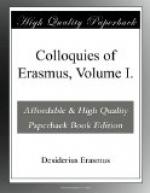Ur. It is a Thing well worthy of our Admiration, and what I myself have observ’d in some Persons. But that in Cato that pleases me the most is his Declaration. Neither am I sorry that I have liv’d. Where is the Christian, that has so led his Life, as to be able to say as much as this old Man? It is a common Thing for Men, who have scrap’d great Estates together by Hook or by Crook, when they are upon their Death Beds, and about to leave them, then to think they have not liv’d in vain. But Cato therefore thought, that he had not liv’d in vain, upon the Conscience of his having discharg’d all the Parts of an honest and useful Citizen, and an uncorrupted Magistrate; and that he should leave to Posterity, Monuments of his Virtue and Industry. And what could be spoken more divinely than this, I depart as from an Inn, and not an Habitation. So long we may stay in an Inn till the Host bids us be gone, but a Man will not easily be forc’d from his own House. And yet from hence the Fall of the House, or Fire, or some Accident drives us. Or if nothing of these happen, the Structure falls to Pieces with old Age, thereby admonishing us that we must change our Quarters.
Neph. That Expression of Socrates in Plato is not less elegant: Methinks, says he, the Soul of a Man is in the Body as in a Garrison, there is no quitting of it without the Leave of the Generals, nor no staying any longer in it, than during the Pleasure of him that plac’d him there. This Allusion of Plato’s, of a Garrison instead of a House, is the more significant of the two. For in a House is only imply’d Abode, in a Garrison we are appointed to some Duty by our Governor. And much to the same Purpose is it, that in Holy Writ the Life of Man is sometimes call’d a Warfare, and at other times a Race.
Ur. But Cato’s Speech, methinks, seems to agree very well with that of St. Paul, who writing to the Corinthians, calls that heavenly Mansion, which we look for after this Life in one Place [Greek: oikian] a House, in another [Greek: oiketerion] a Mansion, and moreover (besides that) he calls the Body [Greek: skenos] a Tabernacle. For we also, (says he) who are in this Tabernacle, groan, being burthened.
Neph. Much after this Manner says St. Peter; And I think it meet (says he) as long as I am in this Tabernacle, to stir you up by putting you in Mind, being assured that I shall shortly put off this Tabernacle. And what else does Christ himself say to us, but that we should live and watch, as if we were presently to die: And so apply ourselves to honest Things, as if we were to live for ever? And when we hear these excellent Words of Cato, O that glorious Day, do we not seem to hear St. Paul himself saying, I desire to be dissolved, and to be with Christ?




